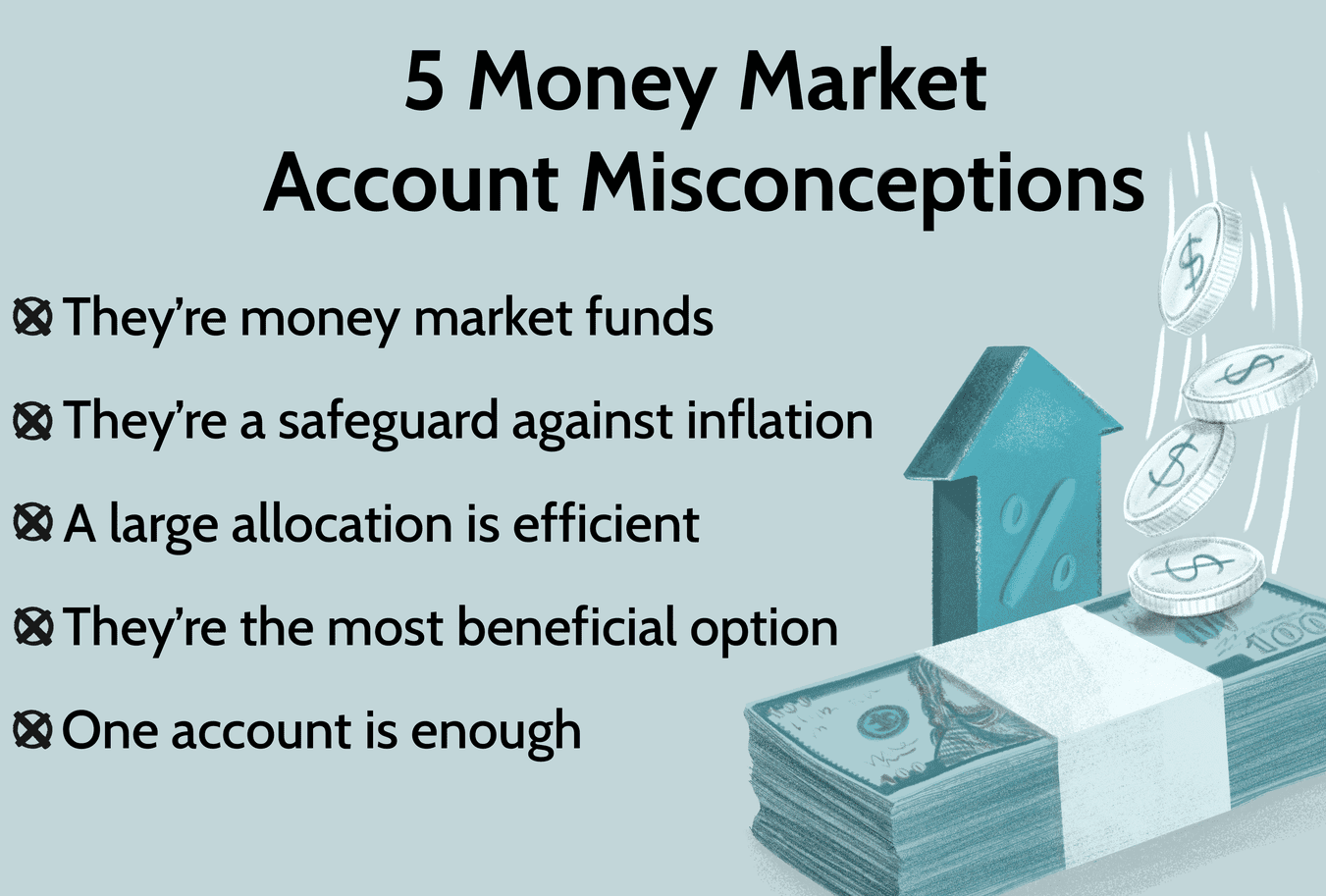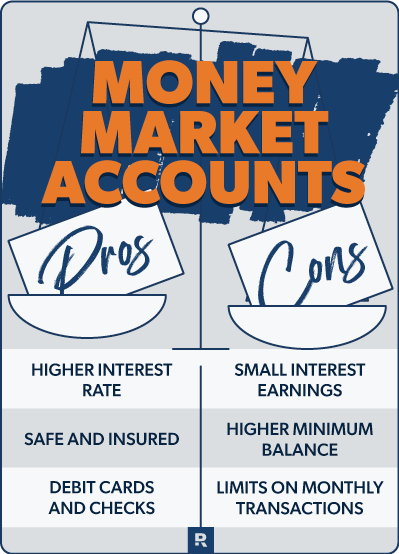A Money Market Account (MMA) is a type of savings account that offers higher interest rates than standard savings accounts, while also allowing limited access to funds through checks and debit cards. These accounts are ideal for people who want a safe way to grow their money while maintaining easy access to funds if needed. Here’s how money market accounts work and what makes them unique.
What Is a Money Market Account?
A Money Market Account (MMA) is a deposit account offered by banks and credit unions, combining features of both savings and checking accounts. MMAs generally offer higher interest rates than traditional savings accounts and come with limited check-writing and debit card access.
- Higher Interest Rates: MMAs typically offer competitive interest rates, sometimes close to or higher than high-yield savings accounts. These rates are usually tied to market conditions, so they can fluctuate over time.
- Minimum Balance Requirement: Most MMAs require a higher minimum balance than standard savings accounts, often between $1,000 and $5,000, which helps banks and credit unions maintain these higher interest rates.
- FDIC or NCUA Insurance: Money market accounts are insured by the FDIC (for banks) or NCUA (for credit unions), protecting deposits up to $250,000, which makes them a secure choice for savers.
For example, a bank may offer an MMA with a 3% APY, requiring a $2,500 minimum balance. Compared to traditional savings accounts offering around 0.5% APY, the MMA provides a much better return on your money.

How Does a Money Market Account Work?
Money Market Accounts work similarly to savings accounts but offer more flexibility with access to your funds. They use your deposited funds to invest in short-term, low-risk financial instruments, which enables banks to offer higher interest rates.
- Interest Earnings: MMAs offer competitive interest rates, often compounded daily or monthly. Compounding means that interest earned is added to your balance, and you earn interest on that new total, helping your money grow faster.
- Accessibility: Unlike traditional savings accounts, MMAs allow you to write checks or use a debit card, although transactions are typically limited to six per month due to federal regulations. This makes MMAs a good choice for those who want occasional access to their funds.
- Account Fees: MMAs may come with monthly maintenance fees if your balance falls below a certain threshold. For example, if your account balance dips below the minimum requirement, you could incur a fee, which would eat into your interest earnings.
Benefits of Money Market Accounts
Money Market Accounts offer several advantages, making them a popular choice for savers who want both growth and flexibility:
- Higher Interest Rates: One of the most significant benefits of MMAs is their interest rates, which tend to be higher than those of standard savings accounts, offering better returns on your deposits.
- FDIC/NCUA Insurance: MMAs are a low-risk investment, as they are insured by either the FDIC or NCUA, giving peace of mind that your money is protected.
- Easy Access to Funds: With limited check-writing capabilities and a debit card, MMAs offer more access to funds than a regular savings account, providing convenience without the risks of a regular checking account.
- Flexibility for Larger Balances: MMAs are especially beneficial for those with larger balances, as higher deposits can lead to better interest returns, maximizing growth.
Differences Between MMA and Other Savings Accounts
While MMAs share some characteristics with regular savings accounts and high-yield savings accounts, they have distinct features:
| Money market accounts | Savings accounts | CDs | |
| Interest rate | Usually higher rates than savings, but lower than CDs | Usually, the highest, as you agree to keep the money in the account for several months or years | No, usually a one-time deposit for a set period |
|---|---|---|---|
| Ability to withdraw or deposit money | Yes, with possible monthly limits on withdrawals | Yes, with possible monthly limits on withdrawals | No, usually a one-time deposit for a set period |
| Early withdrawal penalties | No | No | Yes, a portion of interest earnings |
| Checks and ATM access | Yes | No | No |
| Minimum account balance | High, usually $2,500 | Low, might be $0 | Around $1,000, but it depends on the CD |
- Traditional Savings Account vs. MMA: Regular savings accounts offer lower interest rates, usually around 0.01% to 0.5% APY, and generally don’t come with check-writing or debit card access.
- High-Yield Savings Account vs. MMA: High-yield savings accounts offer similar interest rates but lack the check-writing and debit card features available with MMAs. They’re accessible mostly through online banks and are ideal for those seeking growth without frequent access.
- Money Market Funds vs. MMAs: Money Market Funds (MMFs) are investment products that are not FDIC-insured, as they are typically invested in stocks, bonds, or other assets. MMAs, on the other hand, are deposit accounts insured by the FDIC or NCUA, offering a safer choice for conservative savers.
| Money market account | Money market funds | |
| Purpose of account | For your emergency fund or shorter-term savings goals. | Often for individual investors seeking a parking spot for their cash. |
| How to invest | Deposit money at a financial institution online or in person. | Buy shares at a brokerage, bank, or mutual fund company. |
| Accessing funds | Can withdraw money up to six times per month. (This limit can vary by bank.) | You have ready access to cash. |
| Insurance coverage | Up to $250,000 per bank or credit union customer | No FDIC or NCUA insurance (even when you buy them through a bank) |
How to Open a Money Market Account
Opening an MMA is straightforward and similar to setting up other bank accounts. Here’s a quick overview:
- Choose a Bank or Credit Union: Look for institutions offering competitive APYs on MMAs. Online banks and credit unions tend to offer higher interest rates.
- Meet the Minimum Balance Requirement: You must meet the account’s minimum balance to avoid fees and earn the advertised APY.
- Apply Online or In-Person: Most banks offer both online and in-person applications. You’ll need your personal identification information and funds for the initial deposit.
- Review Terms and Conditions: Check the fees, transaction limits, and compounding frequency to ensure they align with your needs.
Once opened, you can begin funding the account and earning interest, with occasional access to your money if needed.
Pros and Cons of Money Market Accounts
Understanding the pros and cons of MMAs can help determine if they’re the right choice for your financial goals.

Pros:
- Higher Interest Rates: MMAs offer better rates than standard savings accounts.
- Access to Funds: Limited check-writing and debit card access for convenience.
- Insured Safety: FDIC or NCUA insured, making it a low-risk option.
Cons:
- Minimum Balance Requirements: High minimum balance requirements may not suit everyone.
- Transaction Limits: Monthly transaction limits restrict the number of times you can access your funds.
- Potential Fees: Fees may apply if your balance falls below the required minimum or if you exceed the transaction limits.
Is a Money Market Account Right for You?
A Money Market Account could be an excellent choice for those looking for a blend of high-interest earnings and limited access to funds. MMAs work best for savers who want a secure, low-risk account with better interest rates and limited access to funds. However, they may not be ideal if you need regular access to your money. MMAs work well for emergency savings, short-term financial goals, or even as an alternative to a checking account for those who make fewer transactions.
Before deciding, consider your financial goals, the minimum balance requirements, and any fees associated with MMAs. With FDIC or NCUA insurance, they offer a safe, stable way to grow your money, especially if you’re willing to maintain a larger balance and can handle limited monthly transactions.
Related articles:
- Which savings account will earn you the least money?
- Which Savings Account Will Earn You the Most Money?
Sources:
- https://www.bankrate.com/banking/mma/what-is-a-money-market-account/#pros-cons
- https://www.investopedia.com/terms/m/moneymarketaccount.asp
- https://www.nerdwallet.com/article/banking/faq-money-market-account









